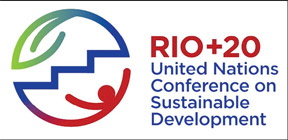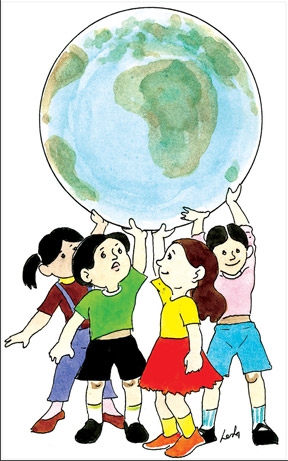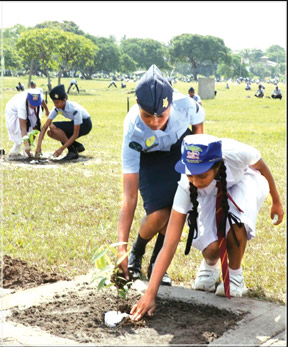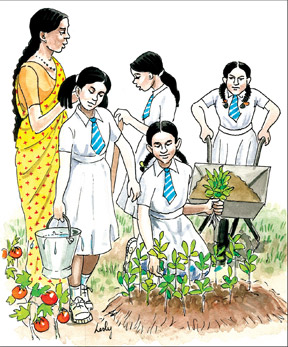|
‘Poverty eradication - greatest global challenge’ -
Part III:
Centrality of UN in advancing Sustainable Development
Text of the final declaration issued by the
world community at the conclusion of the Rio+20 Sustainable Development
Summit recently in Rio de Janeiro, Brazil
Our Common Vision
51. We stress the importance of the participation of workers and
trade unions to the promotion of sustainable development. As the
representatives of working people, trade unions are important partners
in facilitating the achievement of sustainable development in particular
the social dimension. Information, education and training on
sustainability at all levels, including in the workplace, are key to
strengthening workers’ and trade unions’ capacity to support sustainable
development.
52. We recognize that farmers, including small-scale farmers and
fishers, pastoralists and foresters, can make important contributions to
sustainable development through production activities that are
environmentally sound, enhance food security and the livelihood of the
poor, and invigorate production and sustained economic growth.
53. We note the valuable contributions that non-governmental
organizations could and do make in promoting sustainable development
through their well-established and diverse experience, expertise and
capacity, especially in the area of analysis, sharing of information and
knowledge, promotion of dialogue and support of implementation of
sustainable development.
54. We recognize the central role of the United Nations in advancing
the sustainable development agenda. We acknowledge as well, in this
regard, the contributions of other relevant international organizations,
including international financial institutions (IFIs) and multilateral
development banks and stress the importance of cooperation among them
and with the United Nations, within their respective mandates,
recognizing their role in mobilizing resources for sustainable
development.
55. We commit ourselves to re-invigorating the global partnership for
sustainable development that we launched in Rio in 1992. We recognize
the need to impart new momentum to our cooperative pursuit of
sustainable development, and commit to work together with major groups
and other stakeholders in addressing implementation gaps.
III. Green economy in the context of sustainable development and
poverty eradication

56. We affirm that there are different approaches, visions, models
and tools available to each country, in accordance with its national
circumstances and priorities, to achieve sustainable development in its
three dimensions which is our overarching goal. In this regard, we
consider green economy in the context of sustainable development and
poverty eradication as one of the important tools available for
achieving sustainable development and that it could provide options for
policy making but should not be a rigid set of rules. We emphasize that
it should contribute to eradicating poverty as well as sustained
economic growth, enhancing social inclusion, improving human welfare and
creating opportunities for employment and decent work for all, while
maintaining the healthy functioning of the Earth’s ecosystems.
57. We affirm that policies for green economy in the context of
sustainable development and poverty eradication should be guided by and
in accordance with all the Rio principles, Agenda 21 and the
Johannesburg Plan of Implementation and contribute towards achieving
relevant internationally agreed development goals including the MDGs.
58. We affirm that green economy policies in the context of
sustainable development and poverty eradication should:
(a) be consistent with International Law;
(b) respect each country’s national sovereignty over their natural
resources taking into account its national circumstances, objectives,
responsibilities, priorities and policy space with regard to the three
dimensions of sustainable development;
(c) be supported by an enabling environment and well-functioning
institutions at all levels with a leading role for governments and with
the participation of all relevant stakeholders, including civil society;
(d) promote sustained and inclusive economic growth, foster
innovation and provide opportunities, benefits and empowerment for all
and respect of all human rights;
(e) take into account the needs of developing countries, particularly
those in special situations;
(f) strengthen international cooperation, including the provision of
financial resources, capacity building and technology transfer to
developing countries;
(g) effectively avoid unwarranted conditionalities on ODA and
finance;
(h) not constitute a means of arbitrary or unjustifiable
discrimination or a disguised restriction on international trade,
avoiding unilateral actions to deal with environmental challenges
outside the jurisdiction of the importing country, and ensure that
environmental measures addressing trans-boundary or global environmental
problems, as far as possible, are based on an international consensus;
|

Plant a tree and protect the environment |
(i) contribute to closing technology gaps between developed and
developing countries and reduce the technological dependence of
developing countries using all appropriate measures;
(j) enhance the welfare of indigenous peoples and their communities,
other local and traditional communities, and ethnic minorities,
recognizing and supporting their identity, culture and interests and
avoid endangering their cultural heritage, practices and traditional
knowledge, preserving and respecting non-market approaches that
contribute to the eradication of poverty;
(k) enhance the welfare of women, children, youth, persons with
disabilities, smallholder and subsistence farmers, fishers and those
working in small and medium enterprises, and improve the livelihoods and
empowerment of the poor and vulnerable groups in particular in
developing countries;
(l) mobilize the full potential and ensure equal contribution of both
women and men;
(m) promote productive activities in developing countries that
contribute to the eradication of poverty;
(n) address the concern about inequalities and promote social
inclusion, including social protection floors;
(o) promote sustainable consumption and production patterns; and
(p) continue efforts to strive for inclusive, equitable development
approaches to overcome poverty and inequality.
59. We view the implementation of green economy policies by countries
that seek to apply them for the transition towards sustainable
development as a common undertaking, and we recognize that each country
can choose an appropriate approach in accordance with national
sustainable development plans, strategies and priorities.
|

Industrial pollution has negative effects on natural habitat |
60. We acknowledge that green economy in the context of sustainable
development and poverty eradication will enhance our ability to manage
natural resources sustainably and with lower negative environmental
impacts, increase resource efficiency and reduce waste.
61. We recognize that urgent action on unsustainable patterns of
production and consumption where they occur remains fundamental in
addressing environmental sustainability, and promoting conservation and
sustainable use of biodiversity and ecosystems, regeneration of natural
resources, and the promotion of sustained, inclusive and equitable
global growth.
62. We encourage each country to consider the implementation of green
economy policies in the context of sustainable development and poverty
eradication, in a manner that endeavours to drive sustained, inclusive
and equitable economic growth and job creation, particularly for women,
youth and the poor.
In this respect, we note the importance of ensuring that workers are
equipped with the necessary skills, including through education and
capacity building, and are provided with the necessary social and health
protections.
In this regard, we encourage all stakeholders, including business and
industry to contribute, as appropriate. We invite governments to improve
knowledge and statistical capacity on job trends, developments and
constraints and integrate relevant data into national statistics, with
the support of relevant UN agencies within their mandates.
63. We recognise the importance of the evaluation of the range of
social, environmental and economic factors and encourage, where national
circumstances and conditions allow, their integration into decision
making. We acknowledge that it will be important to take into account
the opportunities and challenges, as well as the costs and benefits of
green economy policies in the context of sustainable development and
poverty eradication, using the best available scientific data and
analysis. We acknowledge that a mix of measures, including regulatory,
voluntary and others applied at the national level and consistent with
obligations under international agreements, could promote green economy
in the context of sustainable development and poverty eradication. We
reaffirm that social policies are vital to promoting sustainable
development.
|

Belching smoke from vehicles causes difficulties for fellow
road users |
64. We acknowledge that involvement of all stakeholders and their
partnerships, networking and experience sharing at all levels could help
countries to learn from one another in identifying appropriate
sustainable development policies, including green economy policies.
We note the positive experiences in some countries, including in
developing countries, in adopting green economy policies in the context
of sustainable development and poverty eradication through an inclusive
approach and welcome the voluntary exchange of experiences as well as
capacity building in the different areas of sustainable development.
65. We recognize the power of communications technologies, including
connection technologies and innovative applications to promote knowledge
exchange, technical cooperation and capacity building for sustainable
development. These technologies and applications can build capacity and
enable the sharing of experiences and knowledge in the different areas
of sustainable development in an open and transparent manner.
66. Recognizing the importance of linking financing, technology,
capacity building and national needs for sustainable development
policies, including green economy in the context of sustainable
development and poverty eradication, we invite the UN System, in
cooperation with relevant donors and international organizations to
coordinate and provide information upon request on:
(a) matching interested countries with the partners best suited to
provide requested support;

(b) toolboxes and/or best practices in applying policies on green
economy in the context of sustainable development and poverty
eradication at all levels;
(c) models or good examples of policies of green economy in the
context of sustainable development and poverty eradication;
(d) methodologies for evaluation of policies of green economy in the
context of sustainable development and poverty eradication;
(e) existing and emerging platforms that contribute in this regard.
67. We underscore the importance of governments taking a leadership
role in developing policies and strategies through an inclusive and
transparent process. We also take note of the efforts of those
countries, including developing countries, that have already initiated
processes to prepare national green economy strategies and policies in
support of sustainable development.
68. We invite relevant stakeholders, including the UN Regional
Commissions, UN organizations and bodies, other relevant
intergovernmental and regional organizations, international financial
institutions and major groups involved in sustainable development,
according to their respective mandates, to support developing countries
upon request to achieve sustainable development, including through,
inter alia, green economy policies in the context of sustainable
development and poverty eradication, in particular in least developed
countries.
69. We also invite business and industry as appropriate and in
accordance with national legislation to contribute to sustainable
development and to develop sustainability strategies that integrate,
inter alia, green economy policies.

70. We acknowledge the role of cooperatives and microenterprises in
contributing to social inclusion and poverty reduction in particular in
developing countries.
71. We encourage existing and new partnerships, including
public-private partnerships, to mobilize public financing complemented
by the private sector, taking into account the interests of local and
indigenous communities when appropriate. In this regard, governments
should support initiatives for sustainable development, including
promoting the contribution of the private sector to support green
economy policies in the context of sustainable development and poverty
eradication.
72. We recognize the critical role of technology as well as the
importance of promoting innovation, in particular in developing
countries. We invite governments, as appropriate, to create enabling
frameworks that foster environmentally sound technology, research and
development, and innovation, including in support of green economy in
the context of sustainable development and poverty eradication.
73. We emphasize the importance of technology transfer to developing
countries and recall the provisions on technology transfer, finance,
access to information, and intellectual property rights as agreed in the
Johannesburg Plan of Implementation, in particular its call to promote,
facilitate and finance, as appropriate, access to and the development,
transfer and diffusion of environmentally sound technologies and
corresponding know-how, in particular to developing countries, on
favourable terms, including on concessional and preferential terms, as
mutually agreed. We also take note of the further evolution of
discussions and agreements on these issues since the JPOI.
74. We recognize that the efforts of developing countries that choose
to implement green economy policies in the context of sustainable
development and poverty eradication should be supported through
technical and technological assistance.
IV. Institutional framework for sustainable development
A. Strengthening the three dimensions of sustainable development
75. We underscore the importance of a strengthened institutional
framework for sustainable development which responds coherently and
effectively to current and future challenges and efficiently bridges
gaps in the implementation of the sustainable development agenda. The
institutional framework for sustainable development should integrate the
three dimensions of sustainable development in a balanced manner and
enhance implementation by, inter alia, strengthening coherence,
coordination, avoiding duplication of efforts and reviewing progress in
implementing sustainable development. We also reaffirm that the
framework should be inclusive, transparent and effective and that it
should find common solutions related to global challenges to sustainable
development.
76. We recognize that effective governance at local, sub-national,
national, regional and global levels representing the voices and
interests of all is critical for advancing sustainable development. The
strengthening and reform of the institutional framework should not be an
end in itself, but a means to achieve sustainable development. We
recognize that an improved and more effective institutional framework
for sustainable development at the international level should be
consistent with Rio Principles, build on Agenda 21, and Johannesburg
Plan of Implementation and its objectives on the institutional framework
for sustainable development, and contribute to the implementation of our
commitments in outcomes of UN conferences and summits in economic,
social, environmental and related fields and take into account national
priorities and the development strategies and priorities of developing
countries. We therefore resolve to strengthen the institutional
framework for sustainable development, which will, inter alia:
(a) promote the balanced integration of the three dimensions of
sustainable development;
(b) be based on an action- and result-oriented approach giving due
regard to all relevant cross-cutting issues with the aim to contribute
to the implementation of sustainable development;
(c) underscore the importance of interlinkages among key issues and
challenges and the need for a systematic approach to them at all
relevant levels;
(d) enhance coherence, reduce fragmentation and overlap and increase
effectiveness, efficiency and transparency, while reinforcing
coordination and cooperation;
(e) promote full and effective participation of all countries in
decision-making processes;
(f) engage high level political leaders, provide policy guidance, as
well as identify specific actions to promote effective implementation of
sustainable development, including through voluntary sharing of
experiences and lessons learned;
(g) promote the science-policy interface through inclusive,
evidence-based and transparent scientific assessments, as well as access
to reliable, relevant and timely data in areas related to the three
dimensions of sustainable development, building on existing mechanisms,
as appropriate; in this regard, strengthen participation of all
countries in international sustainable development processes and
capacity building especially for developing countries, including in
conducting their own monitoring and assessments;
(h) enhance the participation and effective engagement of civil
society and other relevant stakeholders in the relevant international
fora and in this regard promote transparency and broad public
participation and partnerships to implement sustainable development;
(i) promote the review and stocktaking of progress in the
implementation of all sustainable development commitments, including
commitments related to means of implementation.
B. Strengthening intergovernmental arrangements for sustainable
development
77. We acknowledge the vital importance of an inclusive, transparent,
reformed and strengthened, and effective multilateral system in order to
better address the urgent global challenges of sustainable development
today, recognizing the universality and central role of the United
Nations, and reaffirming our commitment to promote and strengthen the
effectiveness and efficiency of the United Nations system.
78. We underscore the need to strengthen UN system-wide coherence and
coordination, while ensuring appropriate accountability to Member
States, by, inter alia, enhancing coherence in reporting and reinforcing
cooperative efforts under existing inter-agency mechanisms and
strategies to advance the integration of the three dimensions of
sustainable development within the United Nations system, including
through exchange of information among its agencies, funds and programmes,
and also with the international financial institutions and other
relevant organizations such as the World Trade Organization (WTO),
within their respective mandates.
79. We emphasize the need for an improved and more effective
institutional framework for sustainable development that should: be
guided by the specific functions required and mandates involved; address
the shortcomings of the current system; take into account all relevant
implications; promote synergies and coherence; seek to avoid duplication
and eliminate unnecessary overlaps within the UN system; and, reduce
administrative burdens, and build on existing arrangements.
General Assembly
80. We reaffirm the role and authority of the General Assembly on
global matters of concern to the international community, as set out in
the Charter.
81. We further reaffirm the central position of the General Assembly
as the chief deliberative, policy-making and representative organ of the
United Nations. In this regard, we call for the General Assembly to
further integrate sustainable development as a key element of the
overarching framework for United Nations activities and adequately
address sustainable development in its agenda setting, including through
periodic high-level dialogues.
Economic and Social Council
82. We reaffirm that the Economic and Social Council is a principal
body for policy review, policy dialogue and recommendations on issues of
economic and social development and for the follow-up to the Millennium
Development Goals and a central mechanism for the coordination of the
United Nations system and supervision of the Council’s subsidiary
bodies, in particular its functional commissions, and for promoting the
implementation of Agenda 21 by strengthening system-wide coherence and
coordination. We also reaffirm the major role the Council plays in the
overall coordination of funds, programmes and specialized agencies,
ensuring coherence among them and avoiding duplication of mandates and
activities.
83. We commit to strengthen ECOSOC within its Charter mandate, as a
principal organ in the integrated and coordinated follow-up of the
outcomes of all major UN Conferences and summits in the economic,
social, environmental and related fields, and recognize its key role in
achieving a balanced integration of the three dimensions of sustainable
development.
We look forward to the Review of the Implementation of General
Assembly 61/16 on the Strengthening of ECOSOC.
High level political forum
84. We decide to establish a universal intergovernmental high level
political forum, building on the strengths, experiences, resources and
inclusive participation modalities of the Commission on Sustainable
Development, and subsequently replacing the Commission. The high level
political forum shall follow up on the implementation of sustainable
development and should avoid overlap with existing structures, bodies
and entities in a cost-effective manner.
85. The high level forum could:
(a) provide political leadership, guidance, and recommendations for
sustainable development;
(b) enhance integration of the three dimensions of sustainable
development in a holistic and cross-sectoral manner at all levels;
(c) provide a dynamic platform for regular dialogue, and stocktaking
and agenda setting to advance sustainable development;
(d) have a focused, dynamic and action-oriented agenda, ensuring the
appropriate consideration of new and emerging sustainable development
challenges;
(e) follow up and review progress in the implementation of
sustainable development commitments contained in Agenda 21, Johannesburg
Plan of Implementation, Barbados Programme of Action, Mauritius Strategy
for Implementation and the outcome of this Conference and, as
appropriate, relevant outcomes of other UN summits and conferences,
including the outcome of the Fourth United Nations Conference on the
Least Developed Countries, as well as their respective means of
implementation;
(f) encourage high-level system-wide participation of UN Agencies,
funds and programmes and invite to participate, as appropriate, other
relevant multilateral financial and trade institutions, treaty bodies,
within their respective mandates and in accordance with UN rules and
provisions;
(g) improve cooperation and coordination within the UN system on
sustainable development programmes and policies;
(h) promote transparency and implementation through further enhancing
the consultative role and participation of Major Groups and other
relevant stakeholders at the international level in order to better make
use of their expertise, while retaining the intergovernmental nature of
discussions;
(i) promote the sharing of best practices and experiences relating to
the implementation of sustainable development, and on a voluntary basis,
facilitate sharing of experiences, including successes, challenges, and
lessons learnt;
(j) promote system-wide coherence and coordination of sustainable
development policies;
(k) strengthen the science-policy interface through review of
documentation bringing together dispersed information and assessments,
including in the form of a global sustainable development report,
building on existing assessments;
(l) enhance evidence-based decision-making at all levels and
contribute to strengthen ongoing efforts of capacity building for data
collection and analysis in developing countries.
86. We decide to launch an intergovernmental and open, transparent
and inclusive negotiation process under the General Assembly to define
the high level forum’s format and organizational aspects with the aim of
convening the first high level forum at the beginning of the 68th
session of the General Assembly. We will also consider the need for
promoting intergenerational solidarity for the achievement of
sustainable development, taking into account the needs of future
generations, including by inviting the Secretary General to present a
report on this issue.
C. Environmental pillar in the context of sustainable development
87. We reaffirm the need to strengthen international environmental
governance within the context of the institutional framework for
sustainable development, in order to promote a balanced integration of
the economic, social and environmental dimensions of sustainable
development as well as coordination within the UN system.
88. We are committed to strengthening the role of the United Nations
Environment Programme as the leading global environmental authority that
sets the global environmental agenda, that promotes the coherent
implementation of the environmental dimension of sustainable development
within the United Nations system and that serves as an authoritative
advocate for the global environment. We reaffirm resolution 2997 (XXVII)
of 15 December 1972 which established UNEP and other relevant
resolutions that reinforce its mandate, as well as the 1997 Nairobi and
2000 Malmö Ministerial Declarations. In this regard, we invite the
United Nations General Assembly, in its 67th Session, to adopt a
Resolution strengthening and upgrading UNEP in the following manner:
(a) Establish universal membership in the Governing Council of UNEP,
as well as other measures to strengthen its governance as well its
responsiveness and accountability to Member States;
(b) Have secure, stable, adequate and increased financial resources
from the regular budget of the UN and voluntary contributions to fulfill
its mandate;
(c) Enhance UNEP’s voice and ability to fulfill its coordination
mandate within the UN system by strengthening UNEP engagement in key UN
coordination bodies and empowering UNEP to lead efforts to formulate UN
system-wide strategies on the environment;
(d) Promote a strong science-policy interface, building on existing
international instruments, assessments, panels and information networks,
including the Global Environmental Outlook, as one of the processes
aimed at bringing together information and assessment to support
informed decision-making;
(e) Disseminate and share evidence-based environmental information
and raise public awareness on critical as well as emerging environmental
issues;
(f) Provide capacity building to countries as well as support and
facilitate access to technology;
(g) Progressively consolidate headquarters functions in Nairobi, as
well as strengthen its regional presence, in order to assist countries,
upon request, in the implementation of their national environmental
policies, collaborating closely with other relevant entities of the UN
system;
(h) Ensure the active participation of all relevant stakeholders
drawing on best practices and models from relevant multilateral
institutions and exploring new mechanisms to promote transparency and
the effective engagement of civil society.
89. We recognize the significant contributions to sustainable
development made by the multilateral environmental agreements (MEAs). We
acknowledge the work already undertaken to enhance synergies among the
three Conventions in the chemicals and waste cluster (the Basel,
Rotterdam and Stockholm Conventions). We encourage parties to MEAs to
consider further measures, in these and other clusters, as appropriate,
to promote policy coherence at all relevant levels, improve efficiency,
reduce unnecessary overlap and duplication, and enhance coordination and
cooperation among MEAs, including the three Rio Conventions as well as
with the UN system in the field.
90. We stress the need for the continuation of a regular review of
the state of the Earth’s changing environment and its impact on human
well-being and in this regard, we welcome such initiatives as the Global
Environmental Outlook process aimed at bringing together environmental
information and assessments and building national and regional capacity
to support informed decision making.
D. International financial institutions and UN operational activities
91. We recognize that sustainable development should be given due
consideration by the programmes, funds and specialized agencies of the
UN system and other relevant entities such as international financial
institutions, and the United Nations Conference on Trade and Development
(UNCTAD), in accordance with their respective existing mandates. In this
regard, we invite them to further enhance mainstreaming of sustainable
development in their respective mandates, programs, strategies and
decision-making processes, in support of all countries in particular
developing countries’ efforts in the achievement of sustainable
development.
92. We reaffirm the importance of broadening and strengthening the
participation of developing countries in international economic
decision-making and norm-setting, and in this regard, take note of
recent important decisions on reform of the governance structures,
quotas and voting rights of the Bretton Woods institutions, better
reflecting current realities and enhancing the voice and participation
of developing countries, and reiterates the importance of the reform of
the governance of those institutions in order to deliver more effective,
credible, accountable and legitimate institutions.
93. We call for the further mainstreaming of the three dimensions of
sustainable development throughout the UN System, and request the
Secretary-General to report to the General Assembly through ECOSOC on
the progress made in this regard. We also call for and recognize the
importance of the strengthening of policy coordination within key UN
Secretariat structures so as to ensure system-wide coherence in support
of sustainable development, while ensuring accountability to Member
States.
94. We invite the governing bodies of the funds, programmes and
specialized agencies of the UN development system to consider
appropriate measures for integrating the social, economic and
environmental dimensions across the UN System’s operational activities.
We also emphasize that increasing the financial contributions to the
United Nations development system is key to achieving the
internationally agreed development goals, including the Millennium
Development Goals, and in this regard we recognize the mutually
reinforcing links among increased effectiveness, efficiency and
coherence of the United Nations development system, achieving concrete
results in assisting developing countries in eradicating poverty and
achieving sustained economic growth and sustainable development.
95. We emphasize the need to strengthen operational activities for
development of the UN system in the field that are well aligned with
national sustainable development priorities of developing countries. In
this regard, we emphasize that the fundamental characteristics and
principles of UN operational activities set forth in the relevant
General Assembly resolutions provide the overarching framework for all
matters pertaining to the UN development assistance operations in the
field. We recognize the importance of strengthening UN system
coordination. We look forward to receiving the outcome of the
independent evaluation of the 'Delivering as One' initiative.
96. We call on the UN system to improve the management of facilities
and operations, by taking into account sustainable development
practices, building on existing efforts and promoting cost
effectiveness, and in accordance with legislative frameworks, including
financial rules and regulations, while maintaining accountability to
Member States.
E. Regional, national, sub-national, local
97. We acknowledge the importance of the regional dimension of
sustainable development. Regional frameworks can complement and
facilitate effective translation of sustainable development policies
into concrete action at national level.
98. We encourage regional, national, sub-national and local
authorities as appropriate to develop and utilize sustainable
development strategies as key instruments for guiding decision-making
and implementation of sustainable development at all levels, and in this
regard we recognize that integrated social, economic, and environmental
data and information, as well as effective analysis and assessment of
implementation, is important to decision-making processes.
To be continued
|



